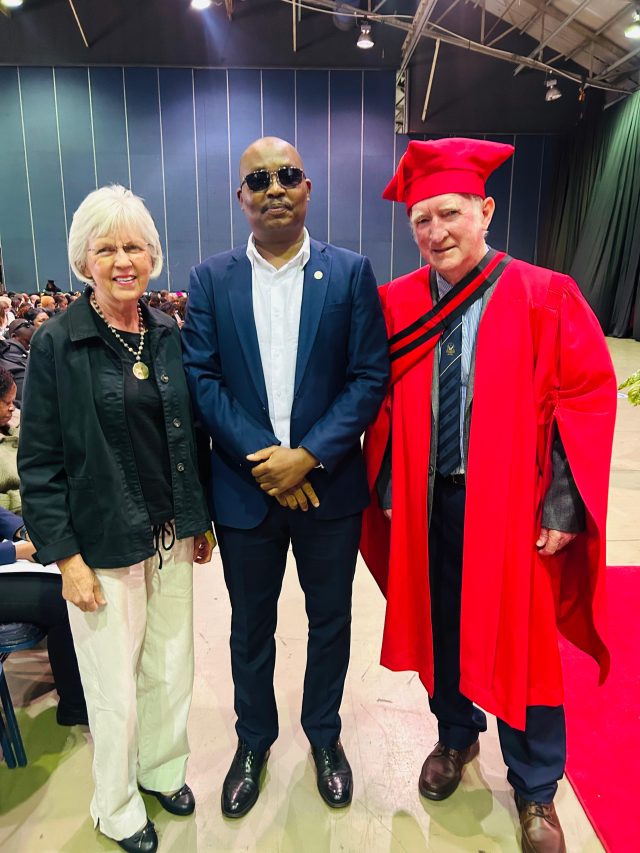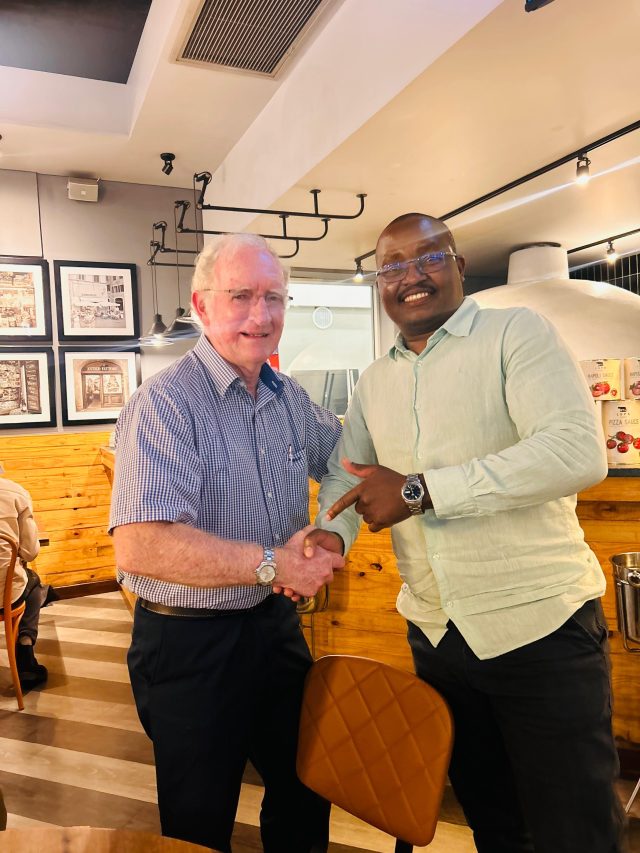Durban, South Africa: There’s something rare in the air, and it’s not just the roar of turbines overhead. It’s the ascent of minds committed to reshaping the trajectory of African aviation law. One of those minds – brilliant, bold, and now officially doubly-doctored – is none other than Dr Brian Suckling, a retired airline captain who boasts qualifications in law, business studies and aviation.
On a crisp Durban morning, under the warm glow of academic regalia and hard-earned accomplishment, Dr Suckling crossed the stage at UNISA to receive his second doctoral degree, this time in Aviation Law. The graduation hall, filled to capacity with academics, loved ones, family members and sponsors, all watched with immense pride, not just because he’s a legal eagle with wings, but because he embodies the ethos of everything we stand for: intellect, innovation, and impact.
Let’s pause there: a second PhD. Not a Master’s degree. Not an honorary scroll. A full-fledged, hard-researched, critically-argued doctoral qualification. And make no mistake -this isn’t just academic indulgence. Dr Suckling’s work couldn’t be more timely.

Titled “A review of South Africa’s obligations in accordance with Annex 13 of the Chicago Convention 1944,” his dissertation takes a scalpel to the very mechanisms that underpin aircraft accident investigations in South Africa. If that sounds niche, let me translate: we’re talking about saving lives, preventing future disasters, and ensuring that when something goes wrong in the sky, our legal systems are robust enough to respond – with precision, not panic. His research was sparked by the crash of the Cessna Citation ZS-CAR near George in the Western Cape.
Dr Suckling’s study comes in the wake of a spate of aviation tragedies that have stunned the nation – from the heartbreaking Middleburg crash that claimed Quinton and Lizzette Steyn, to the Lion & Safari Park disaster that took the life of young pilot Mickyla Steyn, and the devastating KZN crash that ended the lives of aspiring student pilots and a medical student (23-year-old student pilots Nqobile Biyela and Lulama ‘Lwazi’ Msane, along with 20-year-old medical student Siphesihle Buthelezi this week). These are not just statistics. They are futures cut short. And the law has a role to play in making sure this cycle doesn’t repeat.
What makes Suckling’s work even more groundbreaking is that it doesn’t stop at critique – it offers a path forward. Among his boldest recommendations? Amendments to the Civil Aviation Act 13 of 2009 and the establishment of a National Transport Accident Investigation Agency that would handle aviation, maritime, rail, and road disasters alike. An African NTSB of sorts. Yes, it’s ambitious. But so was landing a man on the moon. So is building a safer, smarter, pan-African airspace.

Dr Suckling’s contribution to the aviation sector did not start now. He has served in the South African Airforce where he was a Mirage pilot specialising in formation aerobatics, low level photo reconnaissance and airspace coordination with civil authorities. He also served at South African Airways as a Captain after completing his Airline Transportation Pilot Licence, where he served on all the Boeing 737 and Boeing 747 fleets, including the Airbus A340 and 319/320. He also enjoyed a stint as Management Standards Captain on all the Boeing 737 and Boeing 747 fleets including the Airbus A320/319 fleet. His rich experience includes serving as a non-executive director on the Board of the SACAA where he chaired the Aviation Safety and Environmental Compliance Committee. His footprint in aviation consultation across the country and in the African continent also speaks for itself.
His research was guided by none other than Flying Jurist’s own Prof Angelo Dube, whose dual life as legal scholar (Acting Director at the UNISA School of Law) and licensed pilot continues to inspire an entire generation of aviation lawyers across the continent. Dr Suckling could not stop acknowledging the support that his lovely wife Pamela gave to him during this journey, and the guidance, mentorship and support that Prof Dube has provided, which have cumulatively modelled what academic excellence looks like when rooted in purpose.
And it’s not just about accolades. It’s about application.
We often speak about the future of African aviation as something “out there” – on runways yet to be built, in drones yet to be regulated, in skies yet to be charted. But Suckling reminds us that the future is here. And it’s legal. It’s regulatory. It’s research-based. And it’s African-led. And no one is too young or too old to contribute!
To Dr Suckling, we say: thank you for not just flying high, but for ensuring others can fly safely too. The industry sees you. The academy honours you. And the Flying Jurist salutes you.
Keep watching this airspace.
Vuyolwethu Siyolise Musoke, Correspondent
Vuyo is currently busy with her LLM by full research and is focusing on the area of aviation law and trade.


